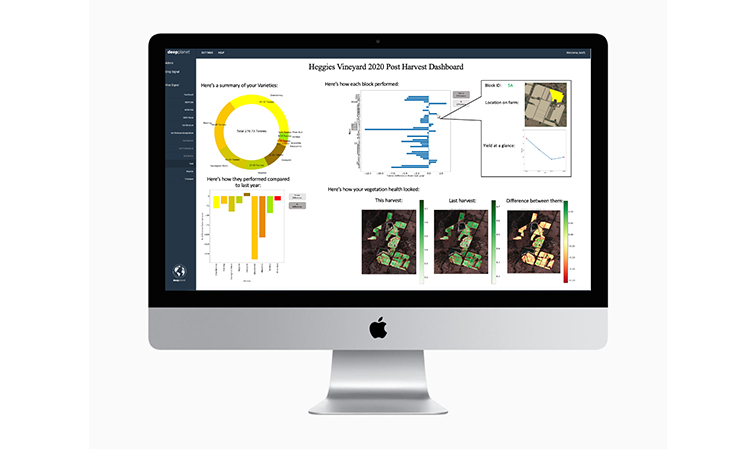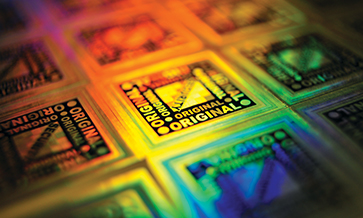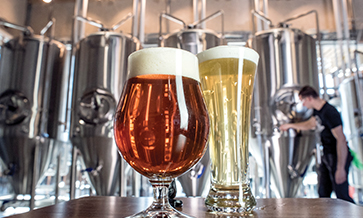Artificial intelligence leverages data to practise smart viticulture
Deep Planet, a UK-based start-up and R&D organisation, is working to help agricultural businesses, supply chain companies and grape growers to gain new and unbiased insights from satellite data while supporting sustainability in their operations.
It has built an AI and machine-learning platform, Vine Signal, which leverages satellite imagery and IoT (Internet of Things) sensors to deliver actionable insights in wine grape growing.
It assists growers and viticulturists to manage yield, maturity and irrigation; predict grape maturity and optimal harvesting dates; forecast yield for picking and vintage planning; optimise irrigation scheduling for correct vine canopy vigour; reduce variability across the vineyard; and identify problem areas.
Vine health
Vineyard variability is driven by climate, features of the land (topography, soil composition, including moisture content and nutrient availability) and diseases. Frequent vine health and leaf moisture monitoring enables growers to identify, predict and respond to areas of vigour variability in their vineyards.
Variability in vine vigour and grape composition makes it difficult for growers to meet uniform quality specifications from winemakers.
Vine Signal can reduce variability and disease by tracking daily, weekly and monthly changes in vegetation. Its unique two-week prediction delivers an accuracy of 93% to see the future impact of irrigation and fertiliser application on a vineyard.
Regular monitoring of vine health variability in the vineyard can be difficult, especially with manual estimation methods. Labour costs, particularly for large blocks, make regular manual monitoring of variability impractical.
Using satellite imagery and drones is expensive, and neither technology is readily available. Moreover, manual techniques cannot be scaled over long distances with accuracy, meaning growers risk significant error margins using these methods at scale.
Estimates only reflect variability at the time of observation. The timing of estimates is generally out of growers’ control and changes in variability cannot be mapped over time.
Deep Planet scientists have worked with viticulturists and growers to develop Vine Signal, which analyses data from satellite imagery, ground sensors and proprietary sources to track and predict vine health on a daily basis.
Crop yields
Vine Signal’s two-week leaf moisture prediction allows grape growers to see irrigation impacts and proactively make necessary changes. It helps optimise on irrigation costs with its soil moisture mapping data.
Vine Signal can map an entire vineyard to a depth of 1.5 metres to give the grower data to back up his/her irrigation decisions.
Vine Signal’s hands-off yield predictions using satellite imagery and AI can forecast grape tonnage by block and variety with 90% accuracy. It also gives growers a visual summary of last season, from bud burst to vintage. It enables growers to make any off-season adjustments for nutrient and variability.
Vine Signal’s dynamic irrigation scheduling helps grape growers optimise irrigation application, to help them conserve water resources, save money and address excessive vigour and vine stress.
Deep Planet scientists are able to give early warning, and track the spread of powdery and downy mildew, botrytis, red lead roll, Eutypa, Phylloxera and other disease conditions.
Vine Signal uses satellite imagery to help growers establish a baseline and monitor soil carbon levels throughout their farms. It identifies degraded areas and promotes practices that support carbon sequestration.
Detection of nutrient deficiencies – such as nitrogen and potassium in the early stages – to optimise input application and achieve healthy vines and grapes is possible. Vine Signal’s vine nutrition app can continuously measure nutrition on any vine across the vineyard in place of laboratory tests.
Harvest prediction
Its machine-learning models detect vineyards with 98% accuracy, observe trends in vine-growing regions, and map vine hectares. Satellite imagery is also used to detect and predict sugar levels.
According to Sushma Shankar, Co-Founder and COO of Deep Planet, Pernod Ricard Winemakers began working with Vine Signal to address their challenges during the 2021 Australian growing season.
Their key objectives were to predict the yield and maturity of their crops at scale using the Vine Signal platform. The project spanned 1,000 hectares, covering multiple wine grape varieties across several key regions in South-Eastern Australia.
As a multi-national business with iconic brands across Australia, New Zealand, the US and Spain, Pernod Ricard faces significant challenges across its global grape growing and wine-making supply chains.
Working out of Oxford, Deep Planet is supported by the European Space Agency, University of Oxford, EIT Food, H2020 and Copernicus Incubation Programme.
Sushma holds an MBA from Oxford University and a Masters in Computer Engineering from Illinois Tech, US. She earlier spent 15 years in business and R&D in the telecom industry with British Telecom, Hitachi and Nortel Networks.
For more information, visit https://www.deepplanet.ai/vinesignal, or write to hello@deepplanet.ai (twitter.com/deepplanet3)

The yield dashboard of Vine Signal platform.














